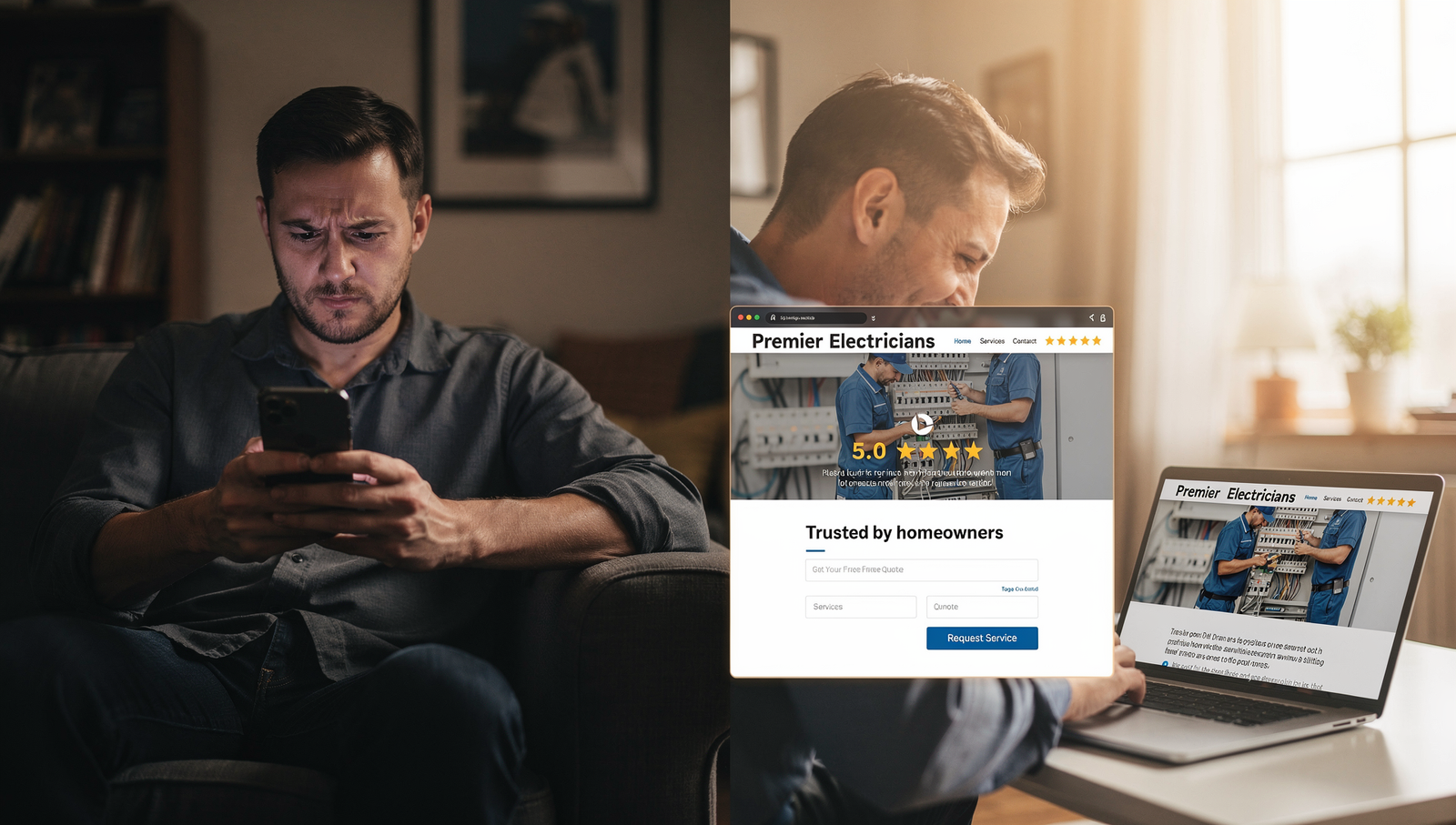11 Local Keyword Ideas for Real Estate Most Agents Miss
The keywords in this blog post are meant as a starting point to get realtors ranking on google locally for their blog posts

Want More Clients Fast?
Steal This Website Rescue Kit to Get More Clients, More Calls, and More Sales on Autopilot
When it comes to real estate marketing, you can spend hours posting on social media, tweaking your website, or sending postcards, but if your site doesn’t show up when people search for homes in your local area, you’re basically throwing a digital open house with no street signs. That’s where local keywords come in. If you know how to pick the right local keyword ideas for real estate, you’ll have buyers and sellers finding you instead of your competition.
In this guide, I’ll walk you through how to uncover the most valuable keywords, why they matter, and how to actually put them to work. Think of this as a mini masterclass, packed with the kind of strategies that big-name agents pay consultants thousands for, but you’re getting them free right here. Let’s dive in.
Why Local Keywords Are a Realtor’s Secret Weapon
Over 90% of home buyers start their search online, and nearly half of all Google searches have a local intent. That means when someone types “homes for sale in Miami Beach” or “best realtor in Denver,” Google is basically matchmaking between their search and the agents who have optimized their websites for those phrases.
Here’s the kicker: most agents only optimize for broad terms like “homes for sale” or “real estate agent.” That’s a crowded battlefield. But local keywords narrow the playing field so you can dominate in your market.
If you’ve ever wondered why Zillow, Realtor.com, and Redfin show up everywhere, it’s because they build massive keyword libraries that cover every neighborhood. But don’t worry. You don’t need their budget to compete. You just need to get laser-focused on the right local keyword ideas for real estate.
How to Find the Best Local Keyword Ideas for Real Estate
1. Start with Google Autocomplete
Go to Google and type “homes for sale in [your city].” Notice the dropdown suggestions that pop up? Those are actual searches people make, and they’re gold. For example, if you type “homes for sale in Dallas,” you might see suggestions like “homes for sale in Dallas under 300k” or “homes for sale near White Rock Lake.”
These long-tail variations are easier to rank for and show clear buyer intent.
2. Use Free Keyword Tools
Remember one of our previous posts, Best Free Tools for Realtors? Tools like Google Keyword Planner, Ubersuggest, and AnswerThePublic are perfect for uncovering local search terms without spending a dime. You can filter searches by city, zip code, or neighborhood and see the monthly search volume.
For example, “Austin condos for sale downtown” might have 320 searches a month. Even if only a fraction of those clicks land on your site, that’s targeted traffic from people ready to buy.
3. Dig Into Neighborhood and School Keywords
People don’t just search by city. They search by neighborhood, subdivision, or even school district. “Homes for sale in Green Valley Ranch” or “best schools in Scottsdale” are high-intent searches. If your website includes pages optimized for those terms, you’re meeting buyers where they are.
Pro tip: Combine your keyword with lifestyle factors. “Pet-friendly condos in Tampa” or “luxury homes near Boulder hiking trails” tap into what really motivates buyers.
4. Spy on Zillow and Realtor.com
Yes, they’re the giants, but they’re also your research assistants. Look at the phrases they use in their titles and descriptions. Chances are, those terms are backed by millions in SEO research. You can tailor them to your hyperlocal market.
Keyword Categories Every Realtor Should Target
Not all keywords are created equal. To build a strong strategy, mix and match categories like these:
Transactional Keywords (High Intent):
“Homes for sale in [city]”
“Condos for sale near [landmark]”
“Luxury homes in [city]”
Informational Keywords (Trust Builders):
“Best neighborhoods in [city] for families”
“Cost of living in [city]”
“How to sell a house fast in [city]”
Branded Keywords (Authority):
“[Your Name] real estate agent [city]”
“[Brokerage name] homes for sale [city]”
Comparative Keywords (Decision Makers):
“Renting vs buying in [city]”
“Top realtors in [city]”
“Zillow vs local realtor in [city]”
When you build a content plan that balances these categories, you create a digital footprint that covers the entire buyer and seller journey.

Real-World Example: Local Keyword Domination
Let’s say you’re a realtor in Charlotte, North Carolina. A standard agent might just target “Charlotte homes for sale.” But a savvy agent (like you’re about to be) goes deeper:
“SouthPark Charlotte homes for sale”
“Ballantyne school district homes”
“Condos near Uptown Charlotte”
“Luxury homes Lake Norman waterfront”
Each of those phrases represents hundreds of monthly searches. If you write blog posts, neighborhood guides, and create IDX property pages around those terms, you’re positioning yourself as the local authority.
And when sellers Google “top realtor Ballantyne Charlotte,” guess whose website they’ll see?
How to Use Local Keywords on Your Website
Finding the keywords is just the beginning. Using them strategically is what gets results. Here’s how to implement them without overstuffing or looking spammy:
Page Titles and Meta Descriptions: Include one or two local keywords naturally. For example, “Luxury Homes in Scottsdale | Jane Doe Realtor.”
Headers (H1, H2): Break content into scannable sections that use variations of your keywords.
Content Body: Write naturally. Mention the keyword a few times, but use synonyms and related terms too.
Image Alt Text: Label your photos with descriptive keywords like “downtown Dallas condo living room.”
Internal Links: When you write about local SEO, link to other valuable posts like Facebook Ads vs Google Ads for Realtors and Real Estate SEO Best Practices to guide readers deeper into your site.
Data Speaks: Why Local Keywords Drive Leads
According to Google, 76% of people who search for something nearby visit a business within 24 hours, and 28% of those searches result in a purchase. For real estate, that means a significant chunk of buyers and sellers are looking for agents today, not someday.
If you want those calls and inquiries, you need to show up when they type “realtor near me” or “sell my house in [city].”
And here’s the beauty: while big platforms chase national terms, you can carve out your local niche and win.
Leveling Up: Advanced Local Keyword Strategies
Once you’ve mastered the basics, here are some next-level moves:
Create Hyperlocal Landing Pages: Build pages for each neighborhood, with IDX listings, market stats, and lifestyle photos.
Blog Like a Local Expert: Posts like “Best Dog Parks in Houston” or “Top Coffee Shops in Denver” draw traffic and show you’re more than just a salesperson.
Leverage Google Business Profile: Keywords in your business description and posts help you rank in Google Maps. Check out our How to Rank Higher on Google Maps guide for step-by-step tactics.
Use Video Titles and Captions: YouTube is the second-largest search engine. A video titled “5 Affordable Neighborhoods in Miami” can generate leads for years.
Bringing It All Together
Local keyword ideas for real estate aren’t just about ranking on Google. They’re about connecting with real people in your market who are actively searching for their next home or the right agent to sell their property. By doing the research, building the right pages, and staying consistent, you’ll establish yourself as the go-to authority in your city.
And the best part? Most agents won’t do this work, which means the opportunity is wide open for you.
Ready to Attract More Buyers and Sellers?
At Digital Dream Homes, we build luxury real estate websites that are not only stunning but also optimized to rank for the exact local keywords your clients are searching. Imagine having a site that works as hard as you do, capturing leads day and night.
Book a free consultation today and let’s turn your website into a lead-generating machine.
Matt Pieczarka
Want a Free Website Audit?
Fill out your information below and we will send you a personal screen share video of tips on how to make your actual website better!
See How Many Closings You're Losing to Zillow!
Click Here to Use our Calculator to See How Many Clients Zillow is Taking From You Per Year!
Some More Posts About Strategy and Growth…
- Marketing Plan For Small Business 2026 Every Owner Should Copy
- Benefits of Professional Website for Small Business: The Hidden Profits
- How to Get More Referrals for Small Local Business Fast
- Customer Retention Strategies Small Business Owners Never Hear About
- How Small Businesses Compete Online And Actually Win In 2026
- Blogging for Small Business Growth: 2026 Profit Multiplier
- Sales Funnel For Small Business Website That Prints Money
- What Is A Listicle And Why Your Website Desperately Needs One
- Strategic Website Design That Turns Small Business Clicks Into Clients
- The Simple Blueprint to Explosive Small Business Growth
9 Functional Medicine Website Designer Tips to Grow Faster
9 Functional Medicine Website Designer Tips to Grow Faster Watch the video to learn one psychological SEO trick to build more trust and get more leads from your website! Wan
7 Functional Medicine Website Design Moves That Get Patients
7 Functional Medicine Website Design Moves That Get Patients Watch the video to learn about the best layout to get more leads and patients guaranteed! Want More Clients Fast
11 Electrician Website Designers That Turn Clicks Into Calls
11 Electrician Website Designers That Turn Clicks Into Calls Watch the video to learn the best layout for best results! https://youtu.be/XaEbNPZxi0U?si=kT1Cru8S2SMJSPNx Want More C
11 Electrician Website Help Fixes That Turn Clicks Into Calls
11 Electrician Website Help Fixes That Turn Clicks Into Calls Watch the video to learn how to structure your website for the best return on investment! https://youtu.be/XaEbNPZxi0U
11 Electrician Web Design Company Questions to Ask
11 Electrician Web Design Company Questions to Ask Watch the video to learn the best website layout for the most lead conversions! https://youtu.be/XaEbNPZxi0U?si=SgxjOWdd7F6f4Mtg
13 Electrician Website Templates That Turn Clicks Into Paid Jobs
13 Electrician Website Templates That Turn Clicks Into Paid Jobs Watch the video to learn the best template layout for the best results! https://youtu.be/XaEbNPZxi0U?si=rGg1WlUWlmH
11 Electrician Website Services That Bring In More Calls
11 Electrician Website Services That Bring In More Calls Watch the video to learn the best website layout for the best results https://youtu.be/XaEbNPZxi0U?si=rGg1WlUWlmHTg73v Want
12 Electrician Website Upgrades That Win More Jobs
12 Electrician Website Upgrades That Win More Jobs Watch the video to learn the best website layout to get the most bang for your buck! https://youtu.be/XaEbNPZxi0U?si=uFqsnSFvenQ1
5 Electrician Website Design Company Upgrades That Win Jobs
5 Electrician Website Design Company Upgrades That Win Jobs Electrician website design that earns trust fast and drives more calls. See the must-have upgrades and book more jobs. h









